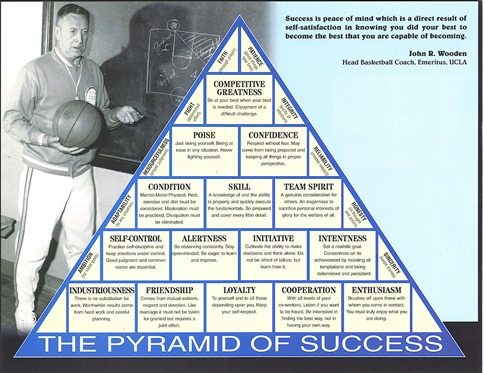By Lindsey Wilson of positiveperformancetraining.com
 Here at Positive Performance, our business circles around one big question:
Here at Positive Performance, our business circles around one big question:
“How do I perform better?”
The answer isn’t so simple, involving a really broad set of answers that reach into various facets of athletic and mental training.
But, in the spirit of this season of giving thanks, I’d like to talk a bit about how thankfulness affects performance. Mostly, being grateful means you have to
Think outside of “you”
Within our mental training program, we teach a principle called ‘Belief in a Purpose’. Essentially, this is about playing and living for something beyond the scoreboard.
For some people, this “something beyond the scoreboard” might be their religion, personal growth, or spirituality. For others, it might be about the pride of a job well done, the challenge of hard work, or the joy that comes from being a part of a group working towards a common goal.
It doesn’t matter WHAT the purpose is. It matters HOW that purpose makes an athlete feel.
Gratitude accomplishes the same thing within us: it instills an appreciation for things that can’t be scored, like comradery, friendship, accomplishment, and blessings, whether big or small. And, by being grateful, we can tap into what makes us tick as athletes, driving us harder to do better. (And this ‘Belief in a Purpose’ principle doesn’t only apply to athletes, but coaches as well.)
We can only be said to be alive in those moments when our hearts are conscious of our treasures.” – Thornton Wilder, playwright and novelist
While gratitude can be applied to many facets of life, I’d like to focus specifically on three that are geared toward athletic competition. So, here are the
3 Ways gratitude helps you perform
1. Gratitude for the big picture
Winning is important. I hate when people say it isn’t, because it is. If winning weren’t important, there wouldn’t be any incentive to improve, to be better and to, well, WIN.
‘Winning’ can take on many forms and mean something different to each athlete. It can mean…
- Fighting the entire game;
- Never giving up;
- Pushing yourself harder than you thought possible;
- Pulling up your teammates when they have lost hope; or
- Simply being better than you were the day before.
But, when someone defines winning as what happens on the scoreboard and by that definition ONLY, there is truly only one winner: the one with the most points. And it’s natural for us to want to be that one.
So we obsess. But obsessing about winning is a counterproductive mindset that, ultimately, makes winning LESS likely to happen, not more.
Therefore, be grateful for the big picture, for that thing beyond the scoreboard that drives you to be your best. Thinking less about winning now and more about ‘winning’ in the way the term applies to you – in essence, believing in your purpose – will help to reduce game day stresses and, in effect, help you to get closer to being the literal winner of the competition.
2. Gratitude for opportunity
It wasn’t so long ago that women, African Americans, and other minorities weren’t allowed to play competitive sports. I come from an athletic and competitive family, and remember distinctly the women in my family lamenting that they played street ball with all the boys until they started menstruating. The pain of having to sit on the sidelines was something they remembered long into adulthood.
Go back further in time, and participation in competitive sports was exclusive to the wealthy and politically influential. In an excerpt from Aristocracy in England, published in 1886, author Adam Badeau said this about the great sport of the time, hunting:
…this pleasure [sport] is a matter of privilege … strictly reserved for the great … God’s uplands and valleys themselves are the playground of the nobility … for the amusement of the aristocracy.”
Sports are that special. They are not only what we, as athletes and coaches, do, but they’re a part of our greater culture and, scientifically and historically, a part of our success as a species.
For ALL athletes (not only women and minorities), the opportunity to play an organized sport is truly a remarkable one. A lot gets invested in an organized sport – a lot of money, a lot of time, and a lot of energy – and not only from you directly. Other parties (i.e. investors, parents, fans, etc.) put a lot of money, time, and energy into the sport, as well, and showing your appreciating their sacrifice and investment by doing your best is all part of the game.
Entitlement is about the worst thing an athlete or coach can go into a game with. Understanding – and being grateful for – the opportunity to play in an organized sport can help prevent an athlete or coach taking that honor for granted.
3. Gratitude for the process
When you are grateful, you pay more attention. Senses are sharpened; our brain kicks into a higher gear, creating a special little spot in our memories for that “unforgettable” moment.
The ever-grateful athlete knows these moments well: you feel the grass under your legs as you stretch for the big race; you hear the rumble of the crowd deep in your bones before kickoff; the smells of the locker room no longer fade into the background, instead coming forward, reminding you of how much you love what you do.
When your senses come alive in these ways, you lose yourself in the process of playing your sport. You might notice a heightened awareness of what is going on around you, or feel a sense of flow or rhythm about what you are doing. It won’t be until later that your realize you had a sense of un-thinking that allowed you to leave self-doubt and hesitation behind.
We call this The Zone. So many athletes have experienced this, enjoyed it, reveled in it, become instantly addicted to it…
…and then, after trying hard, stressing out, and ironically attempting to force their minds to “let go”, wondered why they couldn’t get there again.
So, how do you get back to the Zone? My mentor, Dr. James Hollingsworth, would always tell me,
Fall in love with the game again.” – Dr. James Hollingsworth
Gratitude and love go hand-in-hand
And, overall, that’s what gratitude is: a love for THIS moment, THIS opportunity, THIS game. ALL of it –not only the ups and successes, but also the downs and the tough challenges – leads you to becoming the person you were meant to be, and the winner you ultimately are.
What are you grateful for that drives you to do your best? Share your gratitude in the comments section below so that we might be encouraged through your thankfulness.

Lindsey Wilson - Co-Founder of Positive Performance, Lindsey has been teaching, writing and speaking about mental training for the last 6 years. Lindsey writes regularly on mental training. Her articles have appeared in ESPN’s HoopGurlz.com, AVCA, NSCAA, NYTimes.com, VISIONS magazine, FullCourtPress. com. Contact her atlindsey@positiveperform.com
